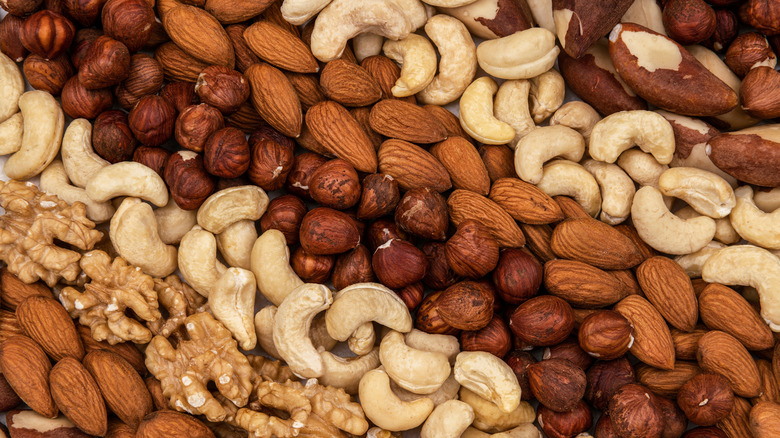The Real Reason Nuts Can Hurt Your Stomach
Nuts are one of those foods that are typically viewed as healthy, boasting several benefits. According to EatingWell, nuts contain omega-3 fatty acids, which may aid in the reduction of inflammation linked to several diseases, including diabetes and cancer. While it's true that nuts have a high-fat content, most of it is monounsaturated, and this kind of fat helps reduce the risk of heart disease.
Along with omega-3 fatty acids, nuts are also high in antioxidants, which are good for your brain. A 2019 review of clinical studies published in the scientific journal Antioxidants showed that the risk of cognitive decline dropped in elderly people who consumed nuts, extending both health and life spans. Nuts might help you lose weight because they may reduce hunger as well as make you feel fuller longer, per EatingWell. So if eating nuts is so healthy, why do some people experience stomach pain after eating them?
Nuts contain a compound that is hard to digest
Nuts contain a substance called phytic acid that prevents them from sprouting before they are ready, dietitian Lily Nichols, RDN, told Livestrong. Phytic acid is what prevents nuts from being completely broken down by the digestive system. This compound is sometimes referred to as an anti-nutrient because it can adversely affect how your body absorbs other nutrients and minerals (via WebMD). In addition, your body needs an enzyme called phytase to break down phytic acid, but it does not make it on its own, so the phytic acid upsets the digestive system. Some people are simply more sensitive to phytic acid, which is why they may develop some stomach discomfort after eating nuts — especially a large amount of them.
Stomach sensitivity does not necessarily mean you have an allergy to nuts. It could mean that you have an intolerance to them, or you simply ate too many in one serving, per Livestrong. If you have any concerns about digestive issues after eating nuts, you should discuss them with your doctor.


